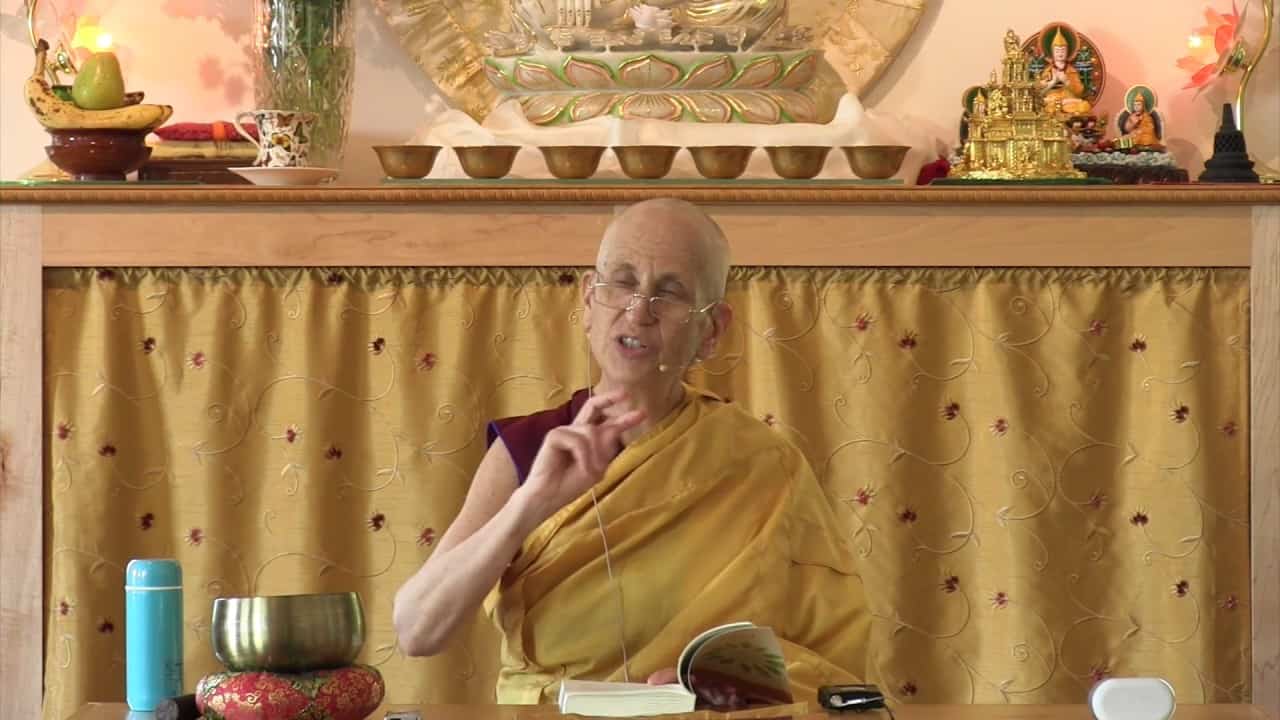Auxiliary bodhisattva ethical restraints 25-34
Auxiliary bodhisattva ethical restraints 25-34
The text turns to training the mind on the stages of the path of advanced level practitioners. Part of a series of teachings on the Gomchen Lamrim by Gomchen Ngawang Drakpa. Visit Gomchen Lamrim Study Guide for a full list of contemplation points for the series.
- Discussion of the last three hindrances to concentration
- Not becoming attached to good qualities of calm-abiding
- Understanding how the fundamental vehicle relates to the universal vehicle
- How to relate to non-Buddhist texts
- When it is appropriate to not attend teachings
Gomchen Lamrim 97: Auxiliary Bodhisattva Ethical Restraints 25-34 (download)
Contemplation points
Venerable Chodron continued the commentary on the bodhisattva ethical code. Consider them one by one, in light of the commentary given. For each, consider:
- What happens if you let your mind go in the direction that the precept is guiding you to avoid? What are the disadvantages and problems of NOT keeping this precept?
- What are the antidotes that can be applied when you are tempted to act or think contrary to the precept?
- Why is this precept so important to the bodhisattva path? How does breaking it harm yourself and others? How does keeping it benefit yourself and others?
- Resolve to be mindful of the precept in your daily life.
Precepts covered this week:
To eliminate obstacles to the far-reaching practice of meditative stabilization, abandon:
- Auxiliary Precept #25: Not abandoning the five obscurations which hinder meditative stabilization: excitement and regret, harmful thought, sleep and dullness, desire, and doubt.
- Auxiliary Precept #26: Seeing the good qualities of the taste of meditative stabilization and becoming attached to it.
To eliminate obstacles to the far-reaching practice of wisdom, abandon:
- Auxiliary Precept #27: Abandoning the scriptures or paths of the Fundamental Vehicle as unnecessary for one following the Mahayana.
- Auxiliary Precept #28: Exerting effort principally in another system of practice while neglecting the one you already have, the Mahayana.
- Auxiliary Precept #29: Without a good reason, exerting effort to learn or practice the treatises of non-Buddhists which are not proper objects of your endeavor.
- Auxiliary Precept #30: Beginning to favor and take delight in the treatises of non-Buddhists although studying them for a good reason.
- Auxiliary Precept #31: Abandoning any part of the Mahayana by thinking it is uninteresting or unpleasant.
- Auxiliary Precept #32: Praising yourself or belittling others because of pride, anger, and so on.
- Auxiliary Precept #33: Not going to Dharma gatherings or teachings.
- Auxiliary Precept #34: Despising the Spiritual Mentor or the meaning of the teachings and relying instead on their mere words; that is, if a teacher does not express him/herself well, not trying to understand the meaning of what he/she says, but criticizing.
Venerable Thubten Chodron
Venerable Chodron emphasizes the practical application of Buddha’s teachings in our daily lives and is especially skilled at explaining them in ways easily understood and practiced by Westerners. She is well known for her warm, humorous, and lucid teachings. She was ordained as a Buddhist nun in 1977 by Kyabje Ling Rinpoche in Dharamsala, India, and in 1986 she received bhikshuni (full) ordination in Taiwan. Read her full bio.


